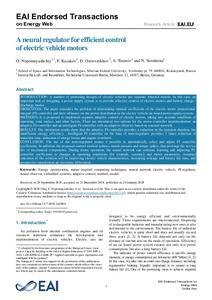Показать сокращенную информацию
A neural regulator for efficient control of electric vehicle motors
| Автор | Nepomnyashchiy, O. | |
| Автор | Kazakov, F. | |
| Автор | Ostroverkhov, D. | |
| Автор | Tarasov, A. | |
| Автор | Sirotinina, N. | |
| Дата внесения | 2021-08-13T09:30:07Z | |
| Дата, когда ресурс стал доступен | 2021-08-13T09:30:07Z | |
| Дата публикации | 2020-01 | |
| Библиографическое описание | Nepomnyashchiy, O. A neural regulator for efficient control of electric vehicle motors [Текст] / O. Nepomnyashchiy, F. Kazakov, D. Ostroverkhov, A. Tarasov, N. Sirotinina // EAI Endorsed Transactions on Energy Web. — 2020. — Т. 7 (№ 28). | |
| ISSN | 2032944X | |
| URI (для ссылок/цитирований) | https://eudl.eu/doi/10.4108/eai.13-7-2018.162804 | |
| URI (для ссылок/цитирований) | https://elib.sfu-kras.ru/handle/2311/142376 | |
| Описание | Текст статьи не публикуется в открытом доступе в соответствии с политикой журнала. | |
| Аннотация | INTRODUCTION: A number of promising designs of electric vehicles use separate wheeled motors. In this case, an important task of designing a power supply system is to provide effective control of electric motors and battery charge / discharge modes. OBJECTIVES: The paper considers the problem of determining optimal coefficients of the electric motor proportionalintegral (PI) controller and their influence on the power distribution in the electric vehicle on-board power supply system. METHODS: It is proposed to implement separate adaptive control of electric motors, taking into account conditions of operating, road surface, and other factors. There are introduced two options for the motor controller implementation: an adaptive PI-controller and an intelligent PI-controller with an adaptive observer based on a neural network. RESULTS: The simulation results show that the adaptive PI-controller provides a reduction in the transient duration, but insufficient energy efficiency. Intelligent PI controller on the base of neuroregulator provides 2 times reduction of transition time, reduction of energy losses and engine overshoot. CONCLUSION: The use of the neuroregulator makes it possible to automatically select and adjust PI controller coefficients. In addition, the proposed control method reduces inrush currents and torque spikes, that prolongs the service life of mechanical components. During motor operation, the neural network can continue learning and adjusting PIcontroller coefficients to changes in operating conditions (for example, seasonal) and motor parameters. Assumed outcomes of this solution will be improving electric vehicle characteristics, increasing mileage and battery life time, and prospective transition to an electronic differential. | |
| Тема | Energy optimization | |
| Тема | nature-inspired computing techniques | |
| Тема | neural network electric vehicle | |
| Тема | PI-regulator | |
| Тема | neural observer | |
| Тема | embedded systems | |
| Тема | adaptive control | |
| Тема | method | |
| Тема | model | |
| Название | A neural regulator for efficient control of electric vehicle motors | |
| Тип | Journal Article | |
| Тип | Published Journal Article | |
| Дата обновления | 2021-08-13T09:30:07Z | |
| DOI | 10.4108/eai.13-7-2018.162804 | |
| Институт | Институт космических и информационных технологий | |
| Подразделение | Кафедра вычислительной техники | |
| Журнал | EAI Endorsed Transactions on Energy Web | |
| Квартиль журнала в Scopus | Q4 |

